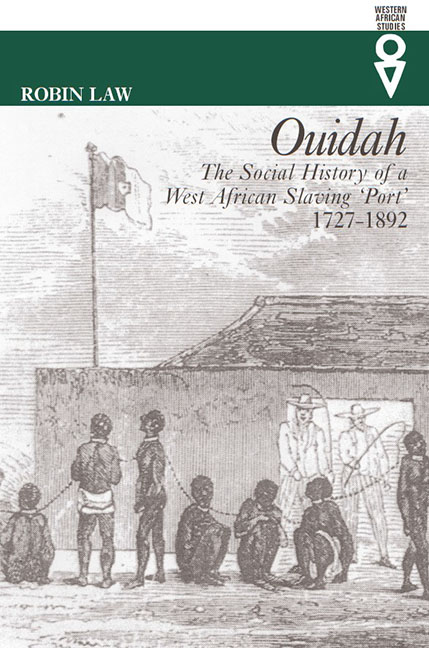Book contents
- Frontmatter
- Dedication
- Contents
- List of Maps & Tables
- Acknowledgements
- Abbreviations
- Map
- Introduction
- 1 Origins: Ouidah before the Dahomian conquest
- 2 The Dahomian Conquest of Ouidah
- 3 Dahomian Ouidah
- 4 The Operation of the Atlantic Slave Trade
- 5 De Souza's Ouidah The era of the illegal slave trade 1815 –39
- 6 The Era of Transition From slaves to palm oil 1840–57
- 7 Dissension & Decline Ouidah under King Glele 1858–77
- 8 From Dahomian to French Rule 1878-92
- Sources & Bibliography
- Index
5 - De Souza's Ouidah The era of the illegal slave trade 1815 –39
Published online by Cambridge University Press: 25 October 2017
- Frontmatter
- Dedication
- Contents
- List of Maps & Tables
- Acknowledgements
- Abbreviations
- Map
- Introduction
- 1 Origins: Ouidah before the Dahomian conquest
- 2 The Dahomian Conquest of Ouidah
- 3 Dahomian Ouidah
- 4 The Operation of the Atlantic Slave Trade
- 5 De Souza's Ouidah The era of the illegal slave trade 1815 –39
- 6 The Era of Transition From slaves to palm oil 1840–57
- 7 Dissension & Decline Ouidah under King Glele 1858–77
- 8 From Dahomian to French Rule 1878-92
- Sources & Bibliography
- Index
Summary
In the first half of the nineteenth century, Ouidah was profoundly affected by the legal banning of the trans-Atlantic slave trade and the adjustments which this necessitated in the conduct of commerce, and by the related development of a substantial Brazilian community in the town. In the early stages of both processes, the central figure was Francisco Felix de Souza, a Brazilian slave-trader who settled permanently in Ouidah in the 1820s. Unfortunately, this critical period in Ouidah's history is in many respects obscure, because of the deficiencies of the available evidence. The detailed documentation provided for the eighteenth century by the European forts ceased when these were abandoned in the early nineteenth century, and European visitors remained rare thereafter until the mid- 1840s. For the 1820s and 1830s, the most informative contemporary material is to be found in the records of judicial proceedings relating to illegal slave-ships captured by the British navy; but these provide only fragmentary (and not always reliable) information on what was going on on shore. To a greater degree than either before or after, the internal history of Ouidah in this period has therefore to be reconstructed on the basis of local oral traditions.
The legal prohibition of the slave trade
The legal banning of the slave trade was a complex and protracted process. As far as it affected Ouidah, the first important move was the abolition of slavery in French colonies by the revolutionary government in 1794, which was itself a recognition of the reality of the destruction of slavery in the principal French colony of Saint-Domingue by the slave insurrection of 1791. Although slavery was relegalized by Napoleon in 1802, the attempt to restore the institution was not effective in Saint-Domingue, serving merely to provoke the proclamation of that country's independence as the Republic of Haiti in 1804. Although French slaving revived after 1802, very few French ships seem to have called at Ouidah. The practical effect, therefore, was that what had lately been the principal market for slaves exported from Ouidah now disappeared.
- Type
- Chapter
- Information
- OuidahThe Social History of a West African Slaving Port 1727-1892, pp. 155 - 188Publisher: Boydell & BrewerPrint publication year: 2017



